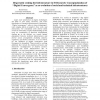Free Online Productivity Tools
i2Speak
i2Symbol
i2OCR
iTex2Img
iWeb2Print
iWeb2Shot
i2Type
iPdf2Split
iPdf2Merge
i2Bopomofo
i2Arabic
i2Style
i2Image
i2PDF
iLatex2Rtf
Sci2ools
106
click to vote
HICSS
2010
IEEE
2010
IEEE
Desperately Seeking the Infrastructure in IS Research: Conceptualization of "Digital Convergence" As Co-Evolution of Social and
Large scale penetration of digital technologies led them to join roads, electricity, and water distribution, as essential infrastructures of modernity. “Digital convergence” refers to these technologies’ wide ranging effects on people’s lives, work, and interactions. Yet conceptions from diverse fields reveal no universally accepted understanding of this term. An examination of historical developments leading up to the Internet era reveals mutual dependence between technical infrastructures and diverse social arrangements including industry, regulatory, and market structures. A set of criteria for the definition of digital convergence (and divergence) is formulated. These provide a working definition that reveals the essential, pervasive and interactive reconfiguration of modern society’s technical and social infrastructures due to digitization. A layer-based model is presented as one possible way of breaking up an increasingly interconnected socio-technical world into separ...
Biometrics | Digital Convergence | Essential Infrastructures | HICSS 2010 | Infrastructures | System Sciences |
| Added | 17 May 2010 |
| Updated | 17 May 2010 |
| Type | Conference |
| Year | 2010 |
| Where | HICSS |
| Authors | David Tilson, Kalle Lyytinen, Carsten Sørensen |
Comments (0)

